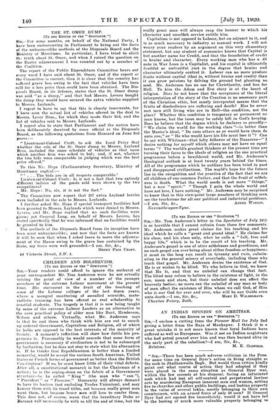CHILDREN AND BOLSHEVISM.
[To THE EDITOR OP THE " SPECTATOR."1 SIR.—Your readers could afford to ignore the outburst of your correspondent Mr. Tom Anderson were he not actually voicing the point of view of a number of the younger members of the extreme Labour movement at the present time. His statement is the fruit of the teaching of E01110 of the Labour colleges of the last dozen years, where a mongrel smattering of so-called scientific, mate- rialistic training has been offered as real scholarship to trustful students. The tragedy is that it is now being taught by some of the extreme Labour Leaders as an alternative to the sane practical policy of older men like Burt, Henderson, Wilson and others. Virtually, what Mr. Anderson says is that he and those who think with him are out to smash up ordered Government, Capitalism and Religion, all of which he holds are opposed to the best interests of the majority of Society. A moment's reflection will show how futile his pro- gramme is. Presumably he would concede that some form of government is necessary if civilisation is not to be submerged by barbarism, but he does not stop to state what his alternative is. If lie thinks that Republicanism is better than a limited monarchy, would he accept the various South American, United States or French forms of government as better than the British Constitution? If so, he must know little of their vital defects. After all, a constitutional monarch is but the Chairman of a nation; be is the coping-stone on the fabric of a Government structure—be he called " King " (the man who " can 1, " President" or " Premier." Humanity will always demand to have its leaders (not excluding Trades Unionism), and may honour them with its tinsel titles, not because really great men want them, but because lesser seen will love to confer them. This does not, of course, mean that the hereditary Duke or Baronet will necessarily be with us till the end of time, but the
really great man will always reap the honour to which his character and unselfish service entitle him.
Capitalism is not opposed to Labour, but an adjunct to it, and is as much necessary to industry as manual work. I will not weary your readers by an argument on this very elementary statement, but any student of economics knows that Capital is but another name for Credit, and that the foundation of credit is brains and character. Every working man who has a .85 note in War Loan is a Capitalist, and his capital is ultimately fruitful or unfruitful just in the degree that brains and character ultimately control it. Labour can no more produce fruits without capital (that is, without brains and credit) than it can grow potatoes by delving the ground but planting no seed. Mr. Anderson has no use for Christianity, and less for Hell. To him the Adam and Eve story is at the heart of religion. Does he not know that the acceptance of the literal interpretation of the story of the Creation is no necessary part of the Christian ethic, but sanely interpreted means that the fruits of disobedience are suffering and death? Has he never met men still living who are in Hell—the condition, not the place? Whether this condition is temporary or permanent no man knows, but the issue may be safely left in God's keeping. Does he believe that the dogma which he declares so proudly- " We claim the world for the working class "—is better than the Master's ideal, " Do unto others as ye would have them do unto you," or " He who would have his life must lose it"? Can he say with Whitman—that lofty follower of the Nazarene—" I desire nothing for myself which others may not have on equal terms "? The world's greatest thinkers at the present time are turning their faces to the ideals of religion as the one practical programme before a bewildered' world, and Mr. Anderson's theological outlook is at least twenty years behind the times. All of the programme which he outlines has been tried in past and disappeared civilisations. The woyld's hone for the future lies in the recognition and the practice of the fact that we are all children of one common Father, and that the fruit of selfish- ness is death. What the world needs is not more "things," but a new "spirit." " Though I gain the whole world and have not love, I have nothing." Mr. Anderson may be surprised to know that in this view-point large numbers of thinking men see the touchstone for all our political and industrial problems.


































 Previous page
Previous page